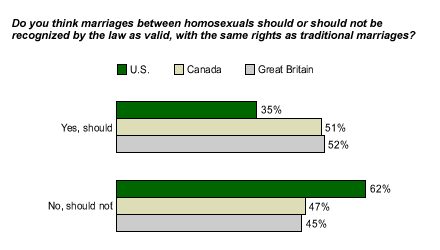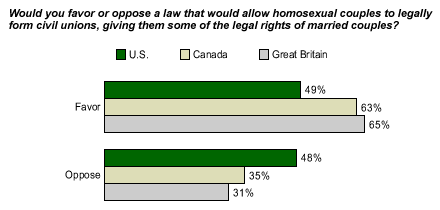If the issue of gay marriage seems to generate more vitriol in the United States than in Great Britain or Canada, then it's probably because Americans are particularly likely to oppose it. About half of Canadians and Britons favor legal marriages for same-sex couples, but the percentage falls to about a third among Americans*. In all three countries, respondents are more open to the idea of civil unions for same-sex couples, but Americans are more resistant to this idea, compared with Canadians and Britons.
Marriage
While there is currently no provision for legal unions between same-sex partners in the United Kingdom, some parts of both the United States and Canada do allow for same-sex marriages. In fact, just last week Canada's Supreme Court started considering the constitutionality of the federal government's proposal to make same-sex marriages legal nationwide. Approximately half of British (52%) and Canadian (51%) respondents think that marriages between homosexuals should be recognized by law as valid, with the same rights as traditional marriages; only 35% of Americans share this view.

Civil Unions
Respondents in all three countries are more likely to support laws that would allow gay couples to legally form civil unions, giving them some of the legal rights of married couples -- but here again Americans are the most conservative. Americans are evenly split on the topic: Almost half (49%) favor a law that would allow homosexuals to legally form civil unions, while a similar percentage (48%) oppose the idea. In Canada and Great Britain, majorities of more than 60% favor civil unions between same-sex couples with close to a third opposing them in each country.

Gallup also queried Canadians and Britons about the right of gay couples to adopt children. Again about half of respondents in each country -- 52% in Canada, 51% in Great Britain -- expressed support for the idea.
Religiosity and Dialogue
Differing levels of religiosity may explain the different outlooks Americans, Britons, and Canadians have on same-sex marriage and civil unions. Americans, as a whole, are more religious than Britons and Canadians (religion is important to more Americans and they go to church or synagogue more often), and religiosity seems to be a key driver of sentiment on gay marriage and civil unions. In each country, citizens who say religion is important to them are more likely to oppose same-sex marriages than are those who say religion isn't important to them.
The varying levels of support are reflected to some degree in changes in social dialogue, too, at least in Great Britain. Albert Catterall, a research director for Gallup in the U.K., notes that media coverage and public opinion regarding gay rights have shifted within the last 20 years. "Adoption rights [for gay couples], allowing public money for gay theater [and other gay-rights reforms] were all passed through -- mostly by the Blair government after 1997 -- and are no longer controversial in the way they were in the 1980s," Catterall says. "Although we do not have proposals to allow same-sex marriage, the registration of ‘civil unions' by local authorities is treated as a quaint local interest story rather than a moral controversy."
That change may be reflected clearly in the attitudes of younger Britons. A generational difference is particularly apparent in Great Britain, where 70% of adults between the ages of 18 and 29 think that marriages between same-sex couples should be valid by law and only 36% of those aged 50 and older have the same opinion. Similar but less dramatic findings are seen in the United States and Canada as well. The views of younger citizens in each country bear close attention as barometers of how the issue might evolve over the next few decades.
*Results in the United States are based on telephone interviews 1,000 national adults, aged 18 and older, conducted May 2-4, 2004. For results based on the total sample of national adults, one can say with 95% confidence that the maximum margin of sampling error is ±3 percentage points. The survey was conducted by Gallup USA.
Results in Canada are based on telephone interviews with 1,005 national adults, aged 18 and older, conducted Aug. 30-Sept. 6, 2004. For results based on the total sample of national adults, one can say with 95% confidence that the maximum margin of sampling error is ±3 percentage points. The survey was conducted by Gallup Canada.
Results in Great Britain are based on telephone interviews with 1,009 national adults, aged 18 and older, conducted Aug. 25-Sept. 7, 2004. For results based on the total sample of national adults, one can say with 95% confidence that the maximum margin of sampling error is ±5 percentage points. The survey was conducted by Gallup UK.
